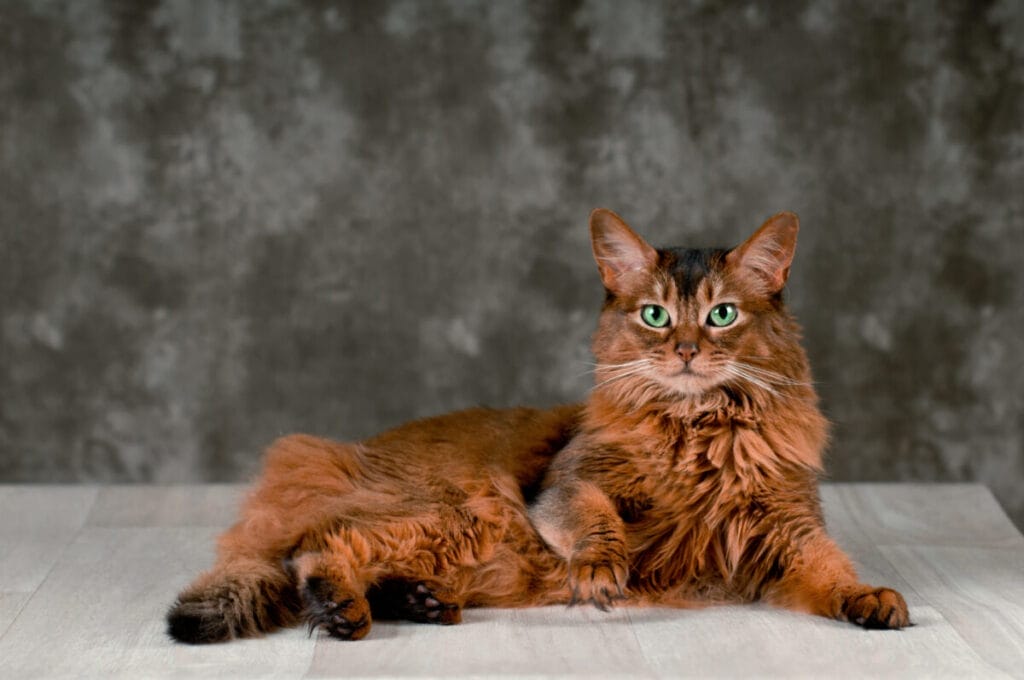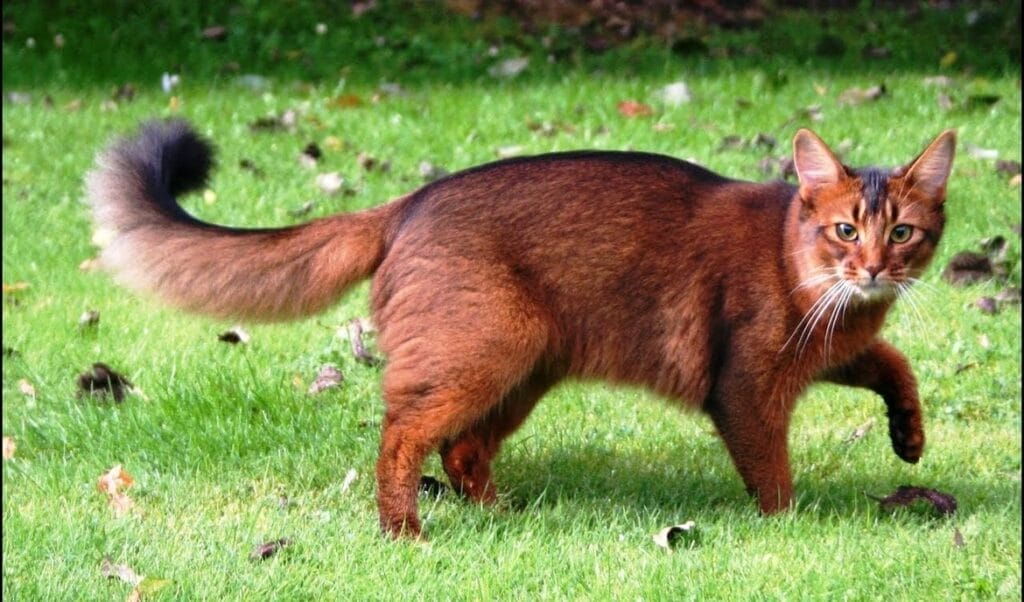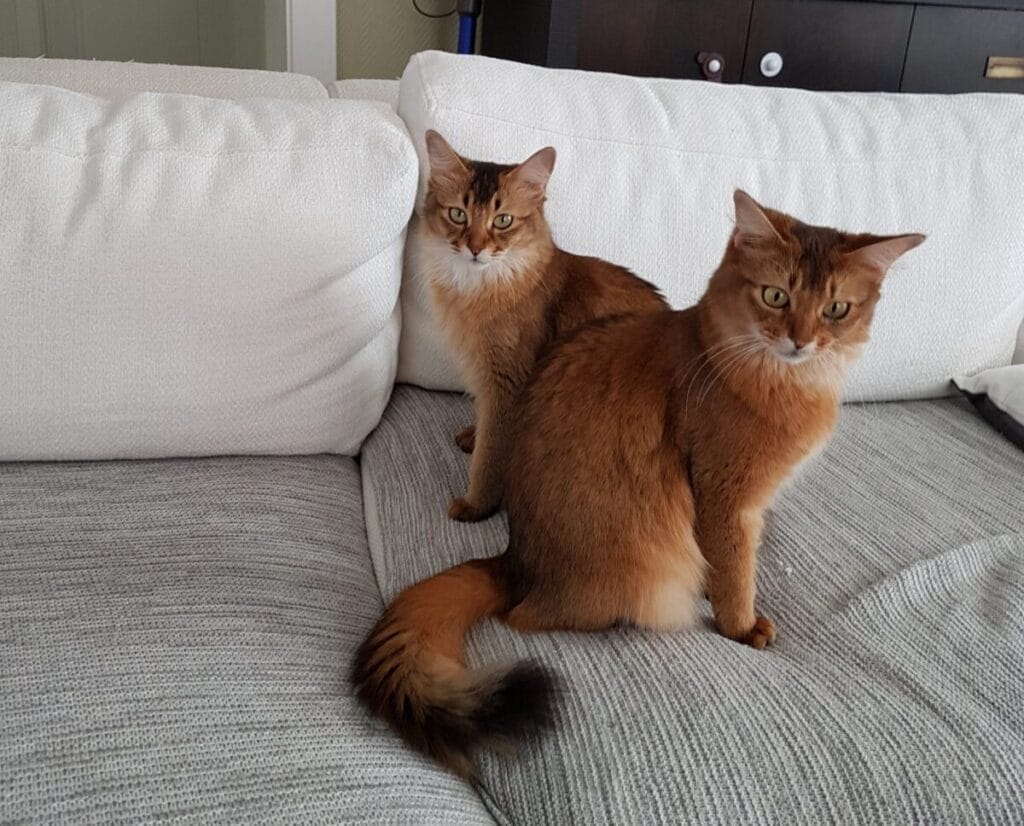The Somali cat breed is essentially a long-haired version of the popular Abyssinian breed. Named for Somalia in Africa, they have a distinctly foxy appearance and lively personalities.
Introduction The Somali Cat Breed
Somalis originated as natural long-haired Abyssinian kittens. Once a spontaneous mutation in some Aby litters, breeders selectively bred them into a new pedigree – the Somali. While very similar to parent breed Abys, Recognized for their medium-long, fluffy soft coats accented by distinct ticking. These active, engaging cats make wonderfully bonded companions when provided adequate exercise and environmental enrichment to stimulate their agile minds and bodies.

Affectionate with Family: ⭐⭐⭐⭐
Amount of Shedding: ⭐⭐⭐
General Health: ⭐⭐⭐
Potential for Playfulness: ⭐⭐⭐⭐⭐
Tendency to Vocalize: ⭐⭐⭐
Kid-Friendly: ⭐⭐⭐⭐
Friendly Toward Strangers: ⭐⭐⭐
Easy to Groom: ⭐⭐
Intelligence: ⭐⭐⭐⭐
Pet Friendly: ⭐⭐⭐
- Medium-sized, muscular yet graceful build
- Distinct ticked coat with long, soft fur
- Large, alert, fox-like ears and expressive almond eyes
- Very energetic, agile, acrobatic
- Highly social, bonds deeply with families
- Lifespan of 9 to 15 years
- Coat colors include ruddy, red, blue, fawn
Somalis originated from natural Abyssinian long-hair mutations. Early generation had recent Aby ancestors.
Caring for a Somali Cat
Food:
- High-protein, meat-focused diets
- Hydrating wet foods
- Digestive care formulas
Environment:
- Tall cat trees and shelves for climbing
- Interactive puzzle feeders and toys
- Sunny window perches
Grooming:
- Regular brushing and combing
- Nail trims every 2-3 weeks
- Teeth and ear cleaning
Enrichment: Engage their active minds via play, environmental exploration opportunities.

Getting a Somali Cat
- Popular: North America, UK, Scandinavia
- Price: $600 – $900 USD
Adoption/Rescue Options:
- The International Cat Association (TICA)
- Regional Somali-specific rescue groups
Pre-Adoption Checks:
- Overall health/energy levels
- Current vaccinations
- Previous medical history
Preparing for a Somali
- Tips: Cat-proof home, set up food stations, tall cat trees, puzzle toys
- Care Tasks: Quality nutrition, exercise, annual vet exams/vaccines, preventatives
- Gear: Premium food, water bowls, trees, scratchers, nail clippers, interactive toys
- Health Issues: Heart conditions, gingivitis, retinal atrophy, patellar luxation
- Key Vaccines: Panleukopenia, rhinotracheitis, calicivirus, rabies, feline leukemia

Popular Somali Cat Names
Names evoking their African roots or fox-like features suit them well.
Examples: Zuri, Safari, Mara, Finnick, Copper, Dash
“Do Somalis prefer outdoors?”
While curious, they’re satisfied indoors if given adequate vertical space, toys and playtime.
“Are Somalis intelligent?”
Yes, highly clever and can learn tricks, fetch toys, and solve puzzle feeders.
“How many Somali types?”
Just one official breed with color variations of ruddy, red, fawn and blue.
“How to curb Somali biting?”
Redirect to appropriate toys, firmly say “no,” ignore after biting, and praise gentle play.
“How to stop scratching?”
Provide scratch posts, trim nails regularly, use calming synthetic pheromone sprays.
“Tips for friendly Somali socialization?”
Positive introductions to new sights/sounds/people/animals during key 7-16 week socialization period.
“How to train a Kitty cat?”
Use rewards like treats, praise and play to motivate learning cues like sit, stay, come, fetch.
“Recommended Cat vet visits?”
Annual exams plus prompt visits for concerning symptoms.
“Good Cats family pets?”
Yes, bond deeply with all family members when properly socialized.
“Cats good with kids?”
Yes, their energetic and friendly nature makes them great companions for gentle kids.
“Cats compatible other pets?”
Yes, early, gradual introductions allow peaceful coexistence with other household pets.
“Can cats trigger allergies?”
While not hypoallergenic, their long fur holds dander close which may help limit environmental shedding/reactions.
“Are cats aggressive?”
No, extremely affectionate and friendly when positively socialized.
“Do cats have hair loss?”
No, their signature long, silky coats are fairly low shedding and not prone to hair loss conditions when properly cared for.
Are you a cat lover who wants to learn more about your furry friends? Do you want to find the best cat food, cat care tips, and resources for your cats? If so, you’ve come to the right place! Welcome to Cat Food Site, the ultimate website for cat enthusiast.
Here you will find everything you need to know about cats Breed, from their health and behavior to their breeds, cat diet and names. You will also discover the latest cat news, cat nutrition, trends, and memes from around the web.

